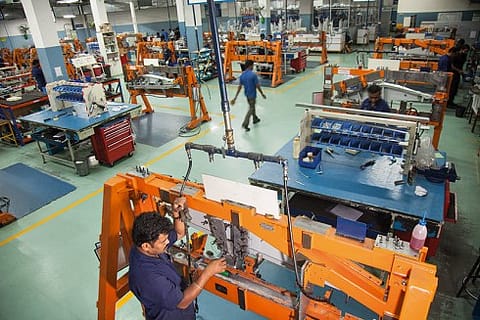Aerospace executives back AI’s future role, but Agentic AI uptake remains minimal: Study
Aside from Agentic AI, robotics and digital twins a key enablers for the transformation of the industry. A digital twin is a virtual model of the real-world physical object.

Over a third aerospace executives believe that artificial intelligence will become the biggest driver in aircraft manufacturing by 2035, a recent study by IT consulting services company Tata Consultancy Services has revealed on Wednesday.
The TCS Future-Ready Skies Study 2025 shows that almost two-third of these executives are willing to allow Agentic AI to manage their future supply chains. However, despite popular acceptance, only a small 6% of these executives are currently engaging with Agentic AI, the report highlights. This leaves massive headroom for growth in terms of innovation.
“Agentic AI can only succeed when it’s built on a strong foundation of connected, reliable data. By integrating and connecting everything across their complex ecosystems, companies can accelerate decisions, scale innovation, and turn complexity into a true competitive advantage,” said Steve Lucas, Chairman and CEO, Boomi, in a statement.
This comes at a time when the global aerospace market is expected to surpass $1 trillion by 2030. Aside from Agentic AI, robotics and digital twins a key enablers for the transformation of the industry. A digital twin is a virtual model of the real-world physical object.
Despite the integral role AI is set to play in aircraft manufacturing in the next ten years, the survey revealed that still three-fifths of the respondents believed that human intervention will remain critical in the sector in future.
The survey received responses from over 323 senior aerospace executives, including aerospace manufacturers, Advanced Air Mobility (AAM) companies and Manufacturing, Repair and Overhaul (MRO) providers, and electric vertical take-off and landing (eVTOL) companies across Europe and North America, the company stated in its release.
The survey intended to study how aerospace companies have prepared to bring AI into their manufacturing processes, including maintenance, mobility, and supply chains.
Recommended Stories
“Today, ambition is redefined as AI moves from supporting operations to shaping enterprise strategy—advancing passenger experience, safety, and sustainability,” said Anupam Singhal, President, Manufacturing, TCS, in a statement.
Despite the growing AI expansion, the study also revealed that fewer than 2 in 5 respondents believed aircraft manufacturing operations ‘to be lights out’ where high level of automation is used, without much human interference in next 7 years.